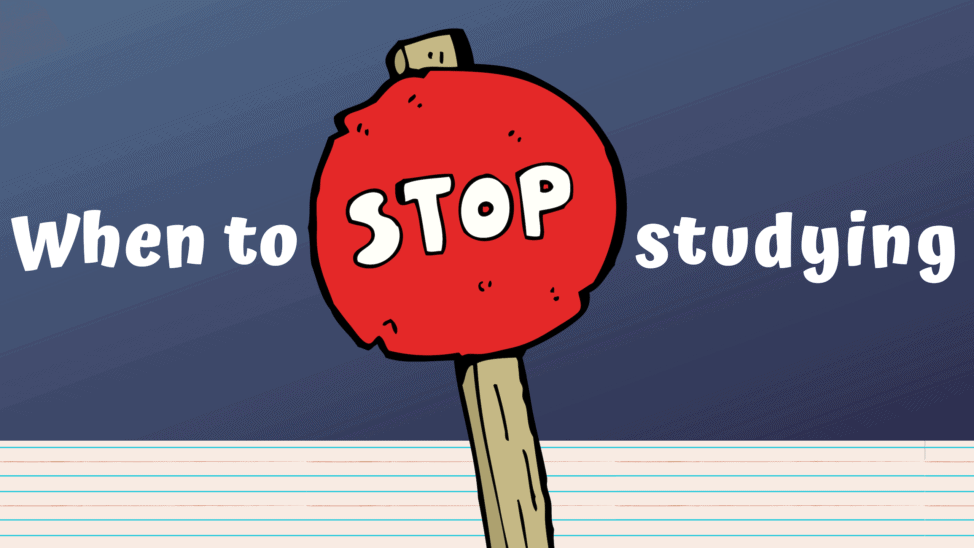
By Katie Azevedo, M.Ed.
Most of the content on this blog and in my videos is centered around how to study. But it’s just as important to know when to stop studying. In some cases, more is not always better. In some cases, you will be better off putting your books away. Intrigued? Read on.
When to stop studying – 3 ways to know you should call it quits
1. You know your material
This one may seem obvious, but you should stop studying when you know the material. The tricky part, however, is accurately judging whether or not you really do know your material.
The solution? After studying whatever you’re learning, TEST YOURSELF on the information. Really, actually test yourself on what you just studied. Put the papers and notes away, and test yourself.
If you know it, then it’s time to stop studying. If you don’t know it, then take a short break and get back to it. Here are strategies for testing yourself.
2. You are exhausted
Of course we are all exhausted. Myself included! But there’s a difference between being tired or bored, and actually being exhausted. If you’re in the middle of a study session and you’re simply tired or bored, then take a short break (10 minutes), change your study location, change your input method (switch from reading text to looking at images, etc.), or find someone to teach the material to. If, however, you are so exhausted that your eyes keep closing or you’re actually falling asleep, then you need to stop studying.
Understand that your brain does not learn when it’s not functioning properly — and if you’re seriously falling asleep, your brain is not ready to learn anything.
According to an article in the Journal of Neuropsychiatric Disease and Treatment, sleep deprivation “interferes with the functioning of certain brain areas and thus impairs cognitive performance.” Additionally, the same article indicates that “both attention and working memory are impaired during prolonged wakefulness.”
What does this mean? It means you won’t remember anything you study if you’re too tired! In times like these, you’re better off taking a 30 minute power nap (set the alarm, folks), or if it’s late at night, just go to bed already — you will learn more if you wake up a little early in the morning to finish what you started.
Also — did you know that the learning process is not complete until we SLEEP?! Yup, when we are asleep, our brains sort and store what we’ve just learned. So go to bed, people!
3. You have already been studying for an hour
If you’ve been studying the same material for an hour, without a break, it’s time to stop studying (for now). After an hour of focusing on the same content, our brains begin to process and store less and less information.
At this point, you should stop studying and do one of the following:
- take a 15-minute break
- switch tasks and move onto a different subject
- test yourself to see if you know the material well enough to actually stop for good
Final notes on when to stop studying
You might be a top student and know all the study techniques in the world (in which case contact me for a job), but knowing when to stop studying is just as important as knowing how to study. It’s the final piece, so to speak.
To be honest, when I was in high school, college, and even graduate school, there were plenty of times when I forced myself to keep studying, despite the fact that I was falling asleep on my books after hours of concentration.
(I needed my own advice back then!)
But in retrospect, that was dumb. I would have been better off just taking a break or accepting that I was actually prepared enough. Again, more is not always better.

